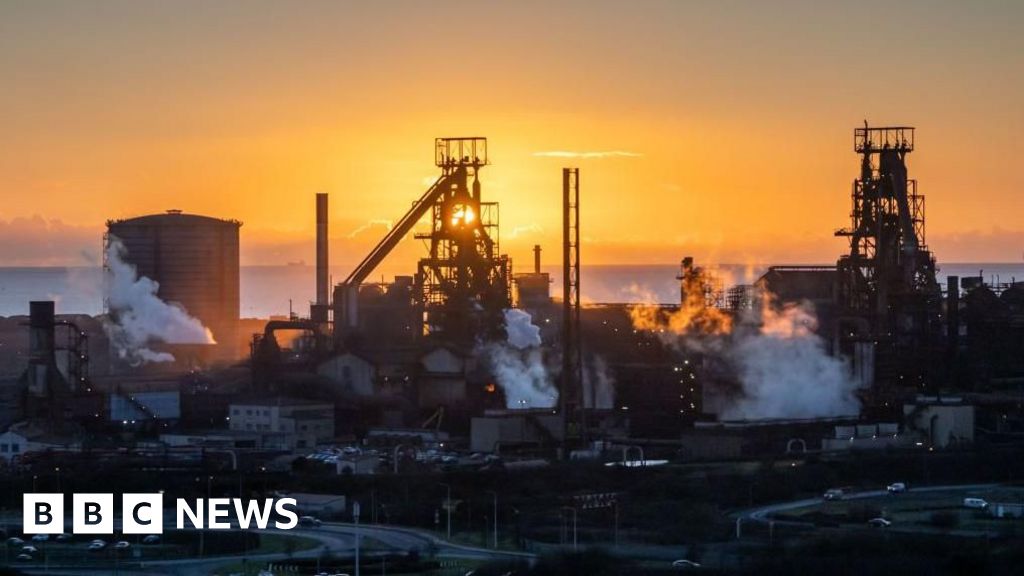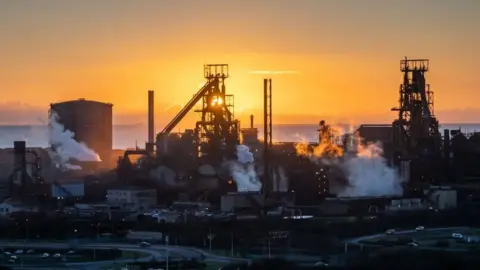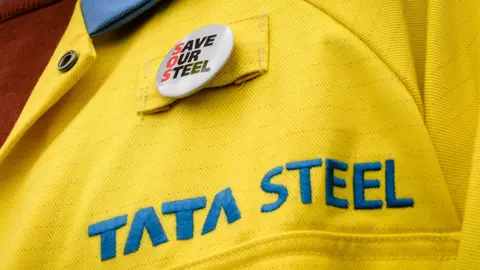Tata Steel: £13.5m to help firms hit by Port Talbot job losses

 Getty Images
Getty ImagesThe first money from a £100m fund to help workers and firms affected by restructuring plans at Tata’s Port Talbot steel plant is being released, UK ministers have announced.
Tata closed one of its two blast furnaces on the site last month and plans to shut the second in September, as it moves to greener production and cuts thousands of jobs.
Welsh Secretary Jo Stevens confirmed that £13.5m from the fund will be made available.
UK ministers are in separate negotiations to try to save jobs at the steel giant, which is planning to lose 2,800 posts.
Ms Stevens told BBC Radio 4’s World At One “everything is on the table” in those talks because “we want to protect as many jobs as possible”.
Asked if she accepted virgin steel will no longer be made in Port Talbot, only recycled steel, she said: “I want to see all types of steel products made in the United Kingdom, and I want to see as many as possible made here in Wales.”
The £13.5m announced on Thursday is to support local firms whose main customer is Tata Steel find new markets and to help workers find new jobs, access training and gain skills and qualifications in areas where there are vacancies.
Tata launched a voluntary redundancy process last month, asking for expressions of interest by 7 August.
Ms Stevens chaired the Tata Steel Port Talbot transition board for the second time on Thursday, a body set up by the previous Conservative government.
Speaking before the meeting she said the “release of an initial £13.5m in funding demonstrates that we will act decisively to support workers and businesses in Port Talbot, working with Welsh government, unions and the wider community”.
She said the funding puts “a safety net in place now to ensure we can back workers and businesses, whatever happens”.
The Labour minister also announced that more than 50 businesses have signed a pledge to support any workers forced to leave their jobs in the steelworks.
 Getty Images
Getty ImagesThe previous Conservative government pledged £500m to Tata towards the cost of a new £1.25bn electric arc furnace, which will melt scrap steel and requires far fewer workers than traditional blast furnaces.
Construction of the new furnace is scheduled to begin in August 2025.
Tata Steel UK chief executive Rajesh Nair said: “The transition board has been set up to support both Tata Steel employees and those in local supply chain companies, so today’s announcement and the ambition to help the region and local communities grow in line with the changing needs of the developing industrial ecosystem here in south Wales, is very much welcomed.”
Alun Davies, the Community union’s national officer for steel, said Ms Stevens had acted “at pace to ensure that this first tranche of funding can be released as swiftly as possible”.
But he stressed “it remains our firm belief that no compulsory redundancies are necessary, and that an alternative approach is still possible”.
 PA Media
PA MediaCharlotte Brumpton-Childs, of the GMB union, said the transition board meeting was “a welcome sign of the reset this new government offers”.
“We are keen to hear further about the government’s commitments to fast and targeted support for industry,” she said.
Unite regional secretary for Wales, Peter Hughes, said his union was “continuing to fight the workers’ corner in ongoing talks with Labour and with Tata over its UK operations”.
‘Fight tooth and claw’
Conservative shadow Welsh secretary Lord Davies of Gower said he was “very pleased to see that financial support from the transition board is reaching those impacted”.
“This deal was only possible because the previous Conservative government intervened in Port Talbot, with one of the biggest support packages in the history of steelmaking to save as many jobs as we could,” he said,
“I am also pleased that Jo Stevens and her colleagues have stopped engaging in deeply irresponsible comments, where they implied that a better deal was possible.”
Plaid Cymru economy and energy spokesman Luke Fletcher welcomed the transition board “moving to protect workers if the worst case scenario were to take place”.
“Plaid Cymru continues to call on the UK Labour government to fight tooth and claw for the steel workers in their negotiations and leave no stone unturned in potential options, including nationalisation, to secure the future of a strategically important asset,” he said.
“We cannot accept the current proposals on the table from Tata.”
Analysis
By Felicity Evans, BBC Wales money editor
Before the general election in July, when UK Labour was still in opposition, the party was very critical of the then Conservative UK government’s approach to Tata’s plans for Port Talbot.
The previous government had agreed to give the company £500m towards the building of a greener electric arc furnace and, along with Tata, create a £100m transition fund to help workers and the wider community cope with the fallout from the thousands of job losses that would result from the closure of the blast furnaces.
Labour promised a new approach, and on taking power, said it was in negotiations with the company and there was “a better deal available”.
Well, the clock is ticking. Only one blast furnace remains operational at Port Talbot and it is still scheduled to close in September.
The new UK government is starting to spend the transition fund announced by its predecessors, but right now its game plan doesn’t seem much different.
Related
Llyods Recruiting Engineers In India After Slashing Jobs In UK
Lloyds Banking Group is planning to hire hundreds of engineers in India as the company plans to shift its employment opportunit
Major new funding for music acts that supercharged careers of…
£1.6m Music Export Growth Scheme to support 58 independent UK artists to tour the world Funding will boost UK’s creative industries – a key growth se
Well-loved restaurant chain to close 8 venues across UK as…
A BELOVED restaurant chain has announced it will close eight venues across the UK, scrapping 158 jobs in the process.Owners are pointing the finger at Labour's
US adds 151,000 jobs in February as unemployment rate ticks…
The latest figures published by the US Bureau of Labor Statistics today (7 March) came in below market expectations, with economists polled by













